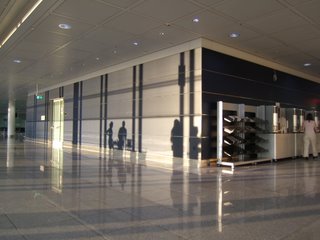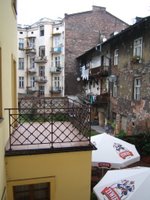Poland - part 1

The day before our flight it was all over the news that a terrorist plot to blow up US-bound planes flying from the UK had just been foiled by British intelligence. Not the kind of thing you want to hear, but it's good to know that 007 is doing his job. Then there's the argument that, with all the increased security measures, these are the safest times to fly. This may be true, but we did have to make some packing adjustments after the "no liquids, creams, or gels" pronouncement.
The next day we took the "Monterey Airbus" to the San Francisco airport, which is as modern and architecturally impressive as they get. There was some terrible traffic going to the airport (supposedly due to some sporting event), but once there, almost zero traffic -- the opposite of the LAX or LaGuardia experience. The international terminal was surprisingly empty, and for all the news reports about crowds and delays, our wait in the Lufthansa line wasn't more than twenty minutes.
The flight to Munich, which spans nine time zones, was rougher than the return a week later. The route consisted of an extreme northern arc over Canada, Greenland, and Scotland. The flight path, as well as the flight time (10-12 hours), resembled the one to Japan, but the flight itself wasn't as comfortable. While the service and amenities were good, there were many small ways that Japan Airlines surpassed their German counterpart. The latter's rough edges included the loud slapping of landing gear, weird turbulence around the arctic circle unlike any I've experienced, and the monitor indicating that it was some minus sixty degrees outside the plane. The general sense was that flying from San Francisco to Munich is a very unnatural act.
In Munich we had three hours to pass before the more local flight to Cracow. The Munich airport was a little like the San Francisco airport -- clean and modern and nearly empty. There was an abundance of shops and restaurants, some very high end, and for a moment I felt like I was at the Americana shopping center in Manhasset. Many of the shops were full of World Cup bric-a-brac, as barely a month had passed since that big event. We took the opportunity to purchase some Euro and Polish "Zwoty" at a currency exchange. Unlike every Safeway supermarket in California, the Bavarian woman at the exchange recognized my last name as French and pronounced it perfectly.
Upon learning that liquids, creams, or gels were not considered a threat to the flight to Cracow, we bought toothpaste, deoderant, and body wash. Then we ate a grilled "Panino" sandwich at a cafe. With even more time to kill, we found a waiting area that provided free coffee and newspapers. I even gave a crack at reading the German ones. It had been some twenty years since my last trip to Europe, and it was good to savor the details.
The plane to Cracow probably flew over the Czech Republic. This information wasn't volunteered, but if you look at a map it makes sense. When we landed in Cracow, the air was moist, the tarmac wet, and the little airport near empty. Lisa had done some research about how to take the bus into town, but it was approaching 11 pm and we were understandably disoriented. We bought bus tickets at a news stand and wandered out to the bus stop. A large, circular Coca-Cola sign confirmed what we have all heard: an eager embrace of western capitalism. We tried to make heads or tails of the bus schedule, and since it was saturday, the outlook didn't look good. A bus finally arrived, but then parked and shut down. I approached the driver, a young, Slavic-looking man, and we proceeded to have a completely confused exchange of hand signals and mispronounced words. Fortunately a pair of women appeared who I recognized from the plane; their first laguage was apparently French, but they also spoke Polish and English. Before long it was established that the bus was headed downtown, but we would have to wait.
A few notes on Cracow. Like many Central European cities Cracow has multiple spellings that are interchanged shamelessly. There is Cracow with a "c" and Krakow with a "k", as well as the German "Krakau" and French "Cracovie". Cracow is the former capital of Poland -- prior to Warsaw -- and is considered the spiritual heart of the Polish state. The Old Town is some seven or eight hundred years old, a historic area that miraculously escaped the ravages of Europe's many wars. What I didn't realize until recently is that Cracow is a major tourist destination within Europe, attracting droves of visitors.

That wasn't exactly clear the night of our arrival, as the bus plowed into the darkness, stopping to pick up drunken skateboard kids, and a heavy rain began to pour. We weren't even certain what exit to get off at. It's true we could have taken a cab, but we were wary of being ripped off, and willing to rough the bus. As soon as we reached the edge of Old Town we disembarked, and although it was raining, I had studied the map well enough to get us to our hotel. It was a little scary, walking through a strange city with heavy backpacks in the pouring rain, surrounded by grafitti and drunks, but around midnight we reached our hotel in the Kazimierz district, just south of Old Town. After checking in, an older man, presumably the bellhop, helped us with our luggage and the strange Polish door locks that need to be turned twice.
Unbelievably jet-lagged and disoriented, I tried to sleep, but with mixed results. As I lay in the foreign bed, the fact of being in Poland weighed on me, its problematic history, which the pouring rain outside seemed to exacerbate. Then the long and turbulent relationship between the Germanic and Slavic peoples weighed on me and kept me up for a few hours. But the fact that the hotel room itself was fairly clean and decent and comfortable helped sleep eventually win out.


0 Comments:
Post a Comment
<< Home